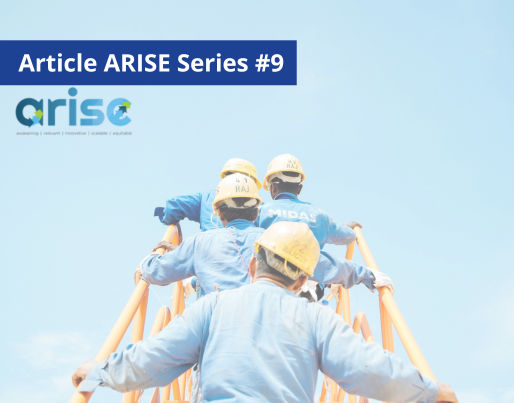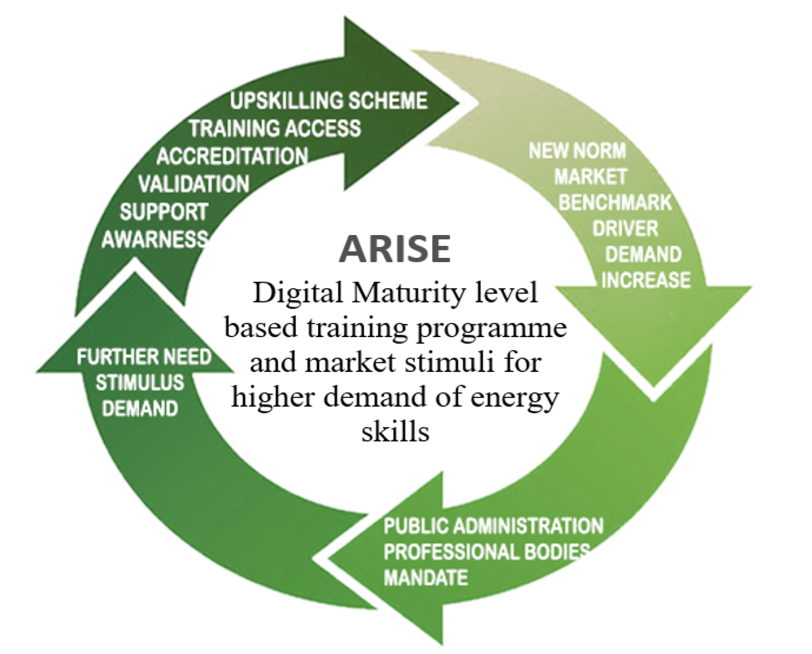
Technical Article - ARISE Article series 'The Currency of Skills' #9: Summary and Conclusion

Technical Article - ARISE Article series 'The Currency of Skills' #9: Summary and Conclusion
In a constantly changing world, the only constant is your team. Built on granite foundations with inherent loyalty, the ARISE team is the star performer in delivering the tools for change. As a team, we have delivered over 55 articles, 12 webinars, and 185 thought-provoking pieces on closing skills gaps to empower industries. However, our best work, with outstanding success and sustainability, is in the ARISE project: Awakening, Relevant, Innovative, Scalable, Equitable, revolutionising the skills interface.
Authors
The 15 authors of the 9 articles in the Currency of Skills series are the ARISE project team.
A project that is redefining skills and training as a digital industry. They are the architects, designers, developers, and delivery team that are creating a highly innovative, agile learning space to sit alongside and integrate with the traditional learning mechanisms, ensuring industry and the workforce have the skills access and mechanisms required to deliver the tools required to achieve a zero carbon transition in construction and other industries.
Paul McCormack | LinkedIn profile
Veronika Schröpfer | LinkedIn profile
Larissa De Rosso | LinkedIn profile
Swapna Mimi Saha | LinkedIn profile
Anna Moreno | LinkedIn profile
Jan Cromwijk | LinkedIn profile
Jaap Kolk | LinkedIn profile
Barry McAuley | LinkedIn profile
Ryan Dempsey
James Harty | LinkedIn profile
Eduardo Rebelo | LinkedIn profile
Andrew Hamilton | LinkedIn profile
António Aguiar Costa | LinkedIn profile
Paulo Carreira | LinkedIn profile
Dijana Likar | LinkedIn profile
Introduction
In this series of 9 articles, the ARISE team have examined how skills have a currency beyond that of just a simple work-based transaction. We have examined the tapestry and exchange rate of skills across the full bandwidth where skills are the key to delivering economic opportunity and economic advantage, delivering enhanced career opportunities, and providing the pathway and advantage of lifelong learning. Skills are also a key instrument in delivering vocational advantage and enhanced social mobility whilst ensuring companies and industries can attain enhanced global competitiveness as a result of a skilled and informed workforce. In addition to real benefits in today’s world of climate challenge and carbon crisis, skills are the real leverage in delivering energy optimisation across the entire value chain.
There is a correlation between skills and the economy, a link that creates an unbreakable bond. Positive increases in the levels of skills will result in a rise in the economic value of a country. This correlation persists for market connectivity and sets the exchange rate or value in which skills are recognised.
To avail of free training just register on the ARISE platform and enrol on the upskilling training on BIM and energy efficiency.
The Fourth Industrial Revolution (4IR)
The Fourth Industrial Revolution (4IR) is being powered by people, people with the skills that can fuel the economy to a new clean, carbon-free destination. The 4IR is characterised by a fusion of technologies that blur the lines between the physical, digital, and biological spheres, and is reshaping industries and the workforce landscape, especially in the construction sector. In this era, skills have become the new currency. The ability to adapt, learn, and apply knowledge effectively is critical for success. Here, we explore seven key metrics that define the value of skills in the context of the Fourth Industrial Revolution.
Knowledge and skills, parallel paths to success
In today’s world, the knowledge and the skills economy are parallel paths to success. The skills economy is a concept in which governments, employers, parents, and young people recognise being a valuable currency for professional success and acknowledge the potential of technical skills to power economic growth. The skills economy is based on the foundation of the economic value of people’s skills and how they can be applied productively at work. Skills hold immense economic value in the rapidly growing construction sector. This sector, driven by a constant demand for development, relies heavily on a skilled workforce to thrive. From architects and engineers to craftsmen and project managers, everyone’s unique set of skills contributes to the successful completion of projects. In this article, we will address the values of skills in the design and construction for qualified workers in society and as individuals. It will also discuss how skilled workers can contribute to economic growth and competitiveness in different sectors.

The skills push and pull: Demand driver approach
Skills and currency exchange rate
We live in a fast-paced ever-changing world, and skills are the lifeblood and currency of the industry. Training and education play a crucial role in nurturing skilled workers in the construction sector. Formal education programs, such as degrees in architecture, engineering, and construction management, provide individuals with a strong foundation of knowledge and skills. These programs equip students with technical expertise and a deep understanding of industry principles. They provide immense economic value and are the keys to a successful career pathway.
Additionally, the construction industry benefits from ongoing training and upskilling programs, especially new bite-sized, task-based learning programmes such as the ARISE project. Continuing education courses, workshops, and seminars enable skilled workers to stay updated with the latest industry trends, regulations, and technological advancements. This commitment to lifelong learning ensures that skilled workers remain relevant and adaptable in a rapidly evolving industry.
Skills investment
Lifelong Learning is the ultimate investment in skills attainment. In today's fast-paced world, the importance of lifelong learning cannot be overstated. With advances in technology and the ever-evolving job market, it has become crucial to continuously upgrade our skills and knowledge. This is especially evident in the construction sector where the technology skills gap is widening. Lifelong learning is not just a means to stay relevant in our careers, but it is also an investment in ourselves that can lead to personal and professional growth. Learners by investing in skills through lifelong learning achieve the skills mechanism to bridge the gap between knowledge and wealth.
The ARISE Digitalisation Strategy Compass (DSC)
Skills assets
Skills are no longer just a means to an end; they have become an asset in their own right. Just like money, skills can be traded, invested, and accumulated. They have the power to open doors and create opportunities. In a skills-based economy, individuals who possess in-demand skills are more likely to secure high-paying jobs and enjoy greater career mobility.
Skills mobility
Skills mobility is a prerequisite in today’s world, and the importance of lifelong learning cannot be overstated. The rapid advancements in technology and the ever-changing job market require individuals to continuously update their skills and knowledge to stay relevant. Lifelong learning is not only crucial for personal growth but also plays a significant role in social mobility. By investing in our skills and embracing lifelong learning, we can unlock a world of opportunities and propel ourselves towards a brighter future.
Social inclusivity & mobility
Skills can provide a pathway for upward social mobility, narrowing the gap between different social strata and promoting social equality. Social mobility skills are the specific abilities and attributes that can contribute to an individual's upward social mobility. These skills empower individuals from disadvantaged backgrounds or marginalised communities to overcome barriers, improve their socio-economic status, and achieve greater opportunities.
ARISE Tailored Training Delivery Model
Skills competitiveness
Remaining competitive in any industry requires a commitment to lifelong learning. This is especially true in the construction sector, where advancements in technology, regulations, and best practices are constantly shaping the landscape. As a construction professional, investing in your skills is not only crucial for personal growth but also for the success of your organisation. By continuously expanding your knowledge and expertise, you can stay ahead of the curve and drive global competitiveness in the construction industry. In an interconnected world, businesses are constantly competing on a global scale. Skills are the differential, highly skilled employees bring unique value to their organisations, beyond what can be provided by cost-effective labour alone.
Stimulating demand for energy-efficient skills
Energy optimisation is a crucial aspect of modern society. As the world grapples with the challenges of climate change and the need for sustainable development, it has become increasingly important to find ways to minimise energy consumption while maximising efficiency. The key to achieving this lies in expertise. The significance of expertise in energy optimisation and discussing how it can be harnessed to achieve optimal results are equally important.
The ARISE project course and module list
Conclusion
By developing and refining these global competitiveness skills, individuals and organisations can enhance their ability to thrive in a globalised economy, seize international opportunities, and remain competitive in an interconnected world.
Recognising the currency of skills underscores the importance of education and training systems that equip individuals with the necessary knowledge and competencies to thrive in the modern economy. It emphasises the need for policies and initiatives that promote skill development, ensure equal access to education and training opportunities, and support lifelong learning. By valuing and investing in skills, individuals and societies can unlock their full potential and seize opportunities in an ever-changing world.
To put the system of skills recognition in operation, a combination of capacity building of the demand side, policy and regulation amendments and financial stimulating and supportive measures for the services supply side is needed. That requires coordinated action at European and national levels, to prepare and implement action plans for reforms in procurement procedures, towards including competencies in sustainable energy and digital skills as a requirement in tender documents for building projects. The transition towards an increased market demand for a qualified workforce should be carried out as a transparent and gradual process, supporting competitiveness and eligibility of professionals and companies while preserving a higher quality of energy performance as an ambitious objective.
By viewing skills as a currency, we allow talent to evolve in an environment where expertise delivers benefits to all. Imaging skills as a currency, from a monetary perspective, facilitate a vision of development, investment and enrichment. The ARISE team has provided insight as to how a modern, digitally enhanced learning process can enable both the learner and the delivery agent to harness the power of skills for success. The series emphasises the importance of continuously investing in skill development to adapt to evolving market demands and achieve personal and professional success. The agile ARISE learning platform encourages readers to embrace a lifelong learning mindset and leverage their diverse skill sets to thrive in a rapidly changing world.
In our global world of 2024, empowering the Fourth Industrial Revolution, skills are the currency that can unlock opportunities and drive success. By focusing on the development and continuous improvement of the wider interpretation of skills as detailed in this series from the ARISE team, individuals and organisations can thrive in an era defined by rapid technological advancement and change. Embracing a mindset of lifelong learning and adaptability is essential to staying relevant and competitive in this dynamic landscape.
Find here all the ARISE 'The Currency of Skills' articles
Technical Article | The Currency of Skills # 1: Skills as a currency in the construction sector, Paul McCormack
Technical Article | The Currency of Skills # 3: Career Opportunity, Paul McCormack and Anna Moreno
Technical Article | The Currency of Skills # 6: Providing Social Mobility, Paulo Carreira, Andrew Hamilton, António Aguiar Costa, Eduardo Rebelo
Technical Article | The Currency of Skills # 7: Global Competitiveness, Paul McCormack
Follow the ARISE project here.

